| Author: | Aaron Zerah | ISBN: | 9780992055363 |
| Publisher: | A to Z Spirit Publishing | Publication: | October 16, 2014 |
| Imprint: | Language: | English |
| Author: | Aaron Zerah |
| ISBN: | 9780992055363 |
| Publisher: | A to Z Spirit Publishing |
| Publication: | October 16, 2014 |
| Imprint: | |
| Language: | English |
Joseph in the Land of the Mizraim is a unique “Holocaust” novel that delivers to the reader an unexpected and ultimately transformational story. All the principal characters in the book are based on real people. Joseph, the main protagonist, is modeled on my father, and his story is at the heart of the novel. Like his namesake, the Biblical Joseph, he finds himself at a young age imprisoned in the land of the mizraim. In Hebrew, mizraim literally means Egypt, yet its root and spiritual meaning is a place of confinement and constriction - the birth canal. In Joseph in the Land of the Mizraim, each character faces his or her own mizraim, and is called to make soul-changing choices. Joseph in the Land of the Mizraim unfolds in the form of the Kabbalistic “Tree of Life”, ascending from Malchut/Realm to Keter/Ultimate, and Joseph takes this journey too, from his first surprising encounter with a friendly Nazi guard in the Warsaw Ghetto to his realization of spiritual freedom at Auschwitz after the war. Each chapter (branch of the tree) illuminates a quality of the divine (Beauty, Loving-kindness,...), and provides the reader a spiritual framework to make, as they move through the book, their own climb into greater understanding and wisdom. While Joseph’s adventures drive the story forward and compel the reader to want to know what will happen next, the novel also interweaves the convergent stories of many other extraordinary characters. There’s Elsa Brunner, whose beloved “Uncle Adi” is actually Adolf Hitler; Chiune Sugihara, the Japanese ambassador who must disobey his government to rescue Jews; Jerzy, a gay Polish comedian, his lover Paul, a young German officer, and Jerzy’s slightly crazy and foul-mouthed parrot, Pu-fu; Noorunissa Khan, the daughter of the founder of a Sufi spiritual order devoted to peace who becomes a spy for the French Resistance; Michal, the philosophical Polish seminarian captured and taken with Joseph on a cattle car bound for Auschwitz; Marian, a very precocious and lusty German farm girl who comes on to Joseph; Frau Schaden, a neighbor of Joseph’s who collaborates with the Gestapo; Joanna Kuehn, a Swiss nurse (modeled on Elizabeth Kubler-Ross) who makes a pilgrimage to Poland to aid refugees; and Sylvie, a Sinti (Gypsy) whose twin was murdered at Auschwitz and who sees visions of the future. In addition to my father’s, many of the core stories of Joseph have been given to me personally. I have had, for example, the great honor of speaking with Mrs. Sugihara and her son, both full of gentle memory. Additionally, I was received graciously in a special audience with Sufi master Hidayat Khan, Noorinissa’s brother. He blessed this work and even offered me his symphonic piece, composed in memory of his sister, to be included in a prospective film score. I have exchanged messages with the late Elizabeth Kubler-Ross and gained a greater understanding of her spiritual outlook and history in war-time Switzerland. By revealing these inner stories, Joseph in the Land of the Mizraim satisfies the reader’s desires for both entertainment and enlightenment.
Joseph in the Land of the Mizraim is a unique “Holocaust” novel that delivers to the reader an unexpected and ultimately transformational story. All the principal characters in the book are based on real people. Joseph, the main protagonist, is modeled on my father, and his story is at the heart of the novel. Like his namesake, the Biblical Joseph, he finds himself at a young age imprisoned in the land of the mizraim. In Hebrew, mizraim literally means Egypt, yet its root and spiritual meaning is a place of confinement and constriction - the birth canal. In Joseph in the Land of the Mizraim, each character faces his or her own mizraim, and is called to make soul-changing choices. Joseph in the Land of the Mizraim unfolds in the form of the Kabbalistic “Tree of Life”, ascending from Malchut/Realm to Keter/Ultimate, and Joseph takes this journey too, from his first surprising encounter with a friendly Nazi guard in the Warsaw Ghetto to his realization of spiritual freedom at Auschwitz after the war. Each chapter (branch of the tree) illuminates a quality of the divine (Beauty, Loving-kindness,...), and provides the reader a spiritual framework to make, as they move through the book, their own climb into greater understanding and wisdom. While Joseph’s adventures drive the story forward and compel the reader to want to know what will happen next, the novel also interweaves the convergent stories of many other extraordinary characters. There’s Elsa Brunner, whose beloved “Uncle Adi” is actually Adolf Hitler; Chiune Sugihara, the Japanese ambassador who must disobey his government to rescue Jews; Jerzy, a gay Polish comedian, his lover Paul, a young German officer, and Jerzy’s slightly crazy and foul-mouthed parrot, Pu-fu; Noorunissa Khan, the daughter of the founder of a Sufi spiritual order devoted to peace who becomes a spy for the French Resistance; Michal, the philosophical Polish seminarian captured and taken with Joseph on a cattle car bound for Auschwitz; Marian, a very precocious and lusty German farm girl who comes on to Joseph; Frau Schaden, a neighbor of Joseph’s who collaborates with the Gestapo; Joanna Kuehn, a Swiss nurse (modeled on Elizabeth Kubler-Ross) who makes a pilgrimage to Poland to aid refugees; and Sylvie, a Sinti (Gypsy) whose twin was murdered at Auschwitz and who sees visions of the future. In addition to my father’s, many of the core stories of Joseph have been given to me personally. I have had, for example, the great honor of speaking with Mrs. Sugihara and her son, both full of gentle memory. Additionally, I was received graciously in a special audience with Sufi master Hidayat Khan, Noorinissa’s brother. He blessed this work and even offered me his symphonic piece, composed in memory of his sister, to be included in a prospective film score. I have exchanged messages with the late Elizabeth Kubler-Ross and gained a greater understanding of her spiritual outlook and history in war-time Switzerland. By revealing these inner stories, Joseph in the Land of the Mizraim satisfies the reader’s desires for both entertainment and enlightenment.















